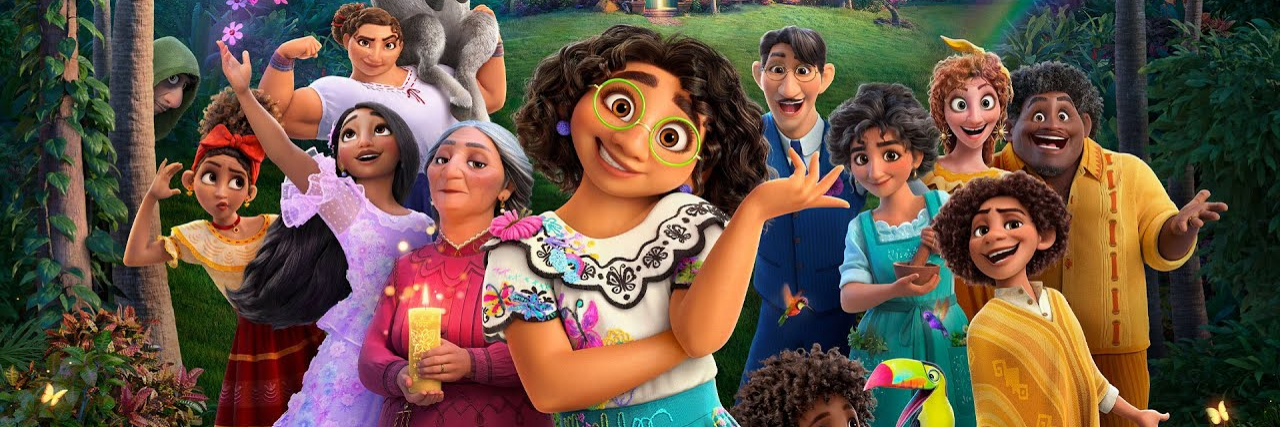What 'Encanto' Teaches Us About Disability, Family, and Acceptance
This past month I think I’ve probably watched “Encanto” almost over five times, if not more.
It’s really good, OK? On around my third or fourth watch, I started to relate my disability narrative and experience with what was happening on-screen. Stick with me, I think I’m on to something here. Naturally, there will be some spoilers up ahead!
Mirabel Madrigal is a young woman growing up without a gift while surrounded by people that are incredibly gifted. Every day she is painfully reminded that other people have gifts and talents that she doesn’t have. At a baseline level, she feels inadequate even in her own family.
Disabled individuals like myself that are surrounded by abled family members oftentimes feel alone and in some ways, abandoned. How can we relate to those we love when we can’t even muster the strength to get out of bed some days or perform basic daily tasks?
Sometimes other family members don’t understand how their ableism is impacting us. They may make passing comments or even direct comments about our weight, our ability or stamina to function, our jobs, our relationships, our parenting styles, etc., or it’s possible that they may directly uninvite us to certain family functions or occasions simply because they think we’re flaky.
Abuela doesn’t intentionally harm Mirabel, but she misdirects her frustration and concerns that the family’s magic is coming apart at Mirabel, making suggestions that Mirabel stay out of the way for Antonio’s big day — the day he gets his gift as the first child since Mirabel to approach the magical door.
Once Antonio receives his gift, Mirabel feels those same pangs of feeling othered as she sings, “Waiting on a Miracle:”
“Can’t keep down the unspoken, invisible pain
Always waiting on a miracle
Always walking alone
Always wanting for more
Like I’m still at that door longing to shine
Like all of you shine.”
Her final, heart-wrenching words to finish the song are “Am I too late for a miracle?”
Like so many of us, if only we could get a miracle to transform our mental health, our physical health, or something else that we feel would bring us that sense of belonging and familiarity amongst our able-bodied friends, family, co-workers, and those we meet in everyday life.
There are moments of acceptance for Mirabel amongst her family members. It’s clear that while many in her own family don’t understand her, she does her best to level with them about trying to discover her own magical ties through her Uncle Bruno. As she opens up and begins searching for answers, other family members open up about how their own health is doing and how much they’re struggling. They also explain why they “don’t talk about Bruno,” Mirabel’s uncle.
Disabled people are always looking for community and family, since many of us often don’t connect with our blood relatives often and, like Mirabel, feel “othered” more frequently than not.
The moment of true understanding for Mirabel comes when she seeks out her Uncle Bruno, whose gift is to see vague happenings in the future. Isolated by the family himself, Bruno is what we would call “the black sheep of the family.” He explains to Mirabel how he isolated himself from everyone else because of a vision he had regarding her. She is the first person in a long time to express how she feels isolated and othered by her family, and he not only listens but comes alongside to help.
For someone who is feeling othered by their own family, even having just one family member sit down and listen to what’s going on in your life, what things about your chronic condition are wearing you down and more can mean more than they know.
By the end of the film — skipping over more than a few spoilers here — Mirabel finally attains the acceptance and love that she has been seeking for so many years. The Madrigals gather around her, finally listening both to what she has to say and what her heart’s desire has been this whole time — to bring her family together.
The concluding song “All of You,” sung by everyone in the family wraps up with the following final lines:
“We see how bright you burn
We see how brave you’ve been
Now, see yourself in turn,
You’re the real gift, kid, let us in.”
Abuela draws Mirabel close, presenting her with a magical doorknob that will bring the Madrigals home for the last time, and says, “Abre los ojos. What do you see?”
And Mirabel, for the first time in her life with the Madrigals sees both herself and how loved she truly is.
“I see me. All of me.”
How long have so many of us longed to feel seen and heard in our families, disabled or otherwise? Sometimes it’s those that we live with and are related to that we have the hardest time making them see and hear us on such a foundational level.
Forgive these long-winded ramblings of a reformed Disney adult, but I hope that whether or not you actually perceived the message of disability found tucked away in Disney’s “Encanto“ or not, you understand how valued and loved you are.
If you’re feeling unloved or othered by your family, I hope that you know that there is a family and community out there waiting for you. Waiting to listen to you and waiting to hear whatever you have to say.
We at the Mighty see how bright you burn and how brave you’ve been. Keep on seeing it through.
If you don’t find that same acceptance in your family, there are others who will be your found family. You’re never alone.
Image via YouTube.

